Dr Nial Moores, Director, Birds Korea, May 17th 2023
Habitat degradation and loss is the most serious threat to biodiversity on Baengnyeong Island, as it is in most of the nation. However, there are additional issues that also reveal how little public understanding there is of the benefits of bird conservation on the island.
For example, on April 28th this year (2023), birder 이건희/ Mr Lee Geon-hee (Justin Lee) found dozens of spring traps set to catch small birds in some arable fields in Jinchon in the northeast of the island. The traps included a small fly attached to a trigger. Birds which had been intentionally killed by the traps included Dusky Thrush 개똥지빠귀, Amur Stonechat 검은딱새 and Richard’s Pipit 큰밭종다리.


Mr Lee took images and reported the exact location of the traps to the local police at the island police station which we visited together the following day. The police officer then went to the area and talked with the farmer. According to the police officer, the farmer(s) apparently suggested that the traps were set to kills crows. (no-one seemed to question the logic of trying to catch a crow with a fly as bait…)
Our National Coordinator, Ms Park Meena, telephoned the police station on May 1st to thank the police for investigating this incident and for helping to prevent crimes against wildlife. She also informed them that killing of wild birds, with the exception of species listed as pests, is illegal in the Republic of Korea, under laws for protection and management of wildlife (specifically 야생생물 보호 및 관리에 관한 법). Even killing of pest species requires a permit.
Information on the bird trapping was also shared with Incheon KFEM, who passed on details to local media. An article was also posted by KFEM on AntNews.
At the request of police in Incheon City, Mr Lee Geon-hee then visited the mainland police office on May 9th and resubmitted his statement. The police told him that three officers would visit the island to investigate.
This incident has at least two main take-aways.
First, the police will take reports of wildlife crime seriously when provided with clear evidence. Please report wildlife crime when you see it.
Second, this is far from the first incident we have reported to the police on Baengnyeong. There is an obvious need for education programs and for participatory planning. Many local people still actively dislike birds, and continue to request the shooting of ducks and rooks by hunting teams – from the Ministry of Environment. I have been compelled to report the reckless and dangerous behaviour of some of these hunters on at least one occasion to the police – as they were shooting very close to a busy road. A bigger question of course is why the Ministry of Environment considers that paying people to shoot ducks and rooks on southward migration in November is a wise use of funds, or the best approach to reducing damage to rice saplings in June and July – when all of the rooks and most of the duck have migrated.
In addition, back in early May 2014, I found and reported several similar-looking traps in fields in two places in Jinchon. The police investigated immediately; spoke to farmers; and apparently stopped the trapping.



In April 2018, we also reported illegal harvesting of Black-tailed Gull eggs, with subsequent sale of the eggs in a local restaurant. This was in breach of a special law passed for the “Five Islands”. The police and island office talked with local residents; and the problem was apparently stopped.

The following month, in recently plowed rice-fields very close to the main colony, I then saw dozens of dead and dying Black-tailed Gulls. Many gulls were coming into bathe; some were flying off; others soon changed behaviour, falling sick. I reported this incident to the police, who investigated. To the best of my knowledge there have been no similar poisoning events in subsequent years.


These kind of issues are primarily the result of a lack of awareness of the values of bird and habitat conservation. Life is genuinely hard for local farmers; and many islanders (and quite a few decision-makers) think that birds damage their rice. Proper education programs are needed on the island to help provide some scientific information on e.g., the role of ducks and geese in controlling weeds and providing natural fertiliser to rice-fields; the value of having large populations of insect-eaters and of bird species which prey on mice and rats; and of course, the potential cultural and recreational values of birds, as birdwatching finally grows much more popular in the ROK. Not everyone will be convinced – but it should help to reduce the need for such frequent police interventions.
We therefore again offer our support to the island, to Incheon City, the Ministry of Environment and other NGOs towards this end. We recognise fully that Birds Korea is a small organisation, lacking substantial funding support or political influence. Nonetheless, for more than a decade now we have provided – and will continue to provide – honest, scientific information to support Baengnyeong’s local communities and decision-makers. Our data and insights have value – because they are based on solid data, and they could help to save money, create jobs, and help the island to develop more sustainably. Towards that end, we have conducted surveys of migrant birds each year since 2013; have conducted a couple of winter bird surveys and one comprehensive breeding bird survey; and we have already published an information-filled report, sharing it in seminars with islanders and some decision-makers off island, which starts to explain the benefits to local residents of bird conservation and identifies key sites for conservation and ecotourism. We even helped develop a set of alternative design proposals relating to Bible Land in collaboration with SAVE International and staff and students at University of California Berkeley that addressed water security and energy issues in addition to promoting cultural and eco-tourism.
Let us all work together, legally and using science, toward a better future.
